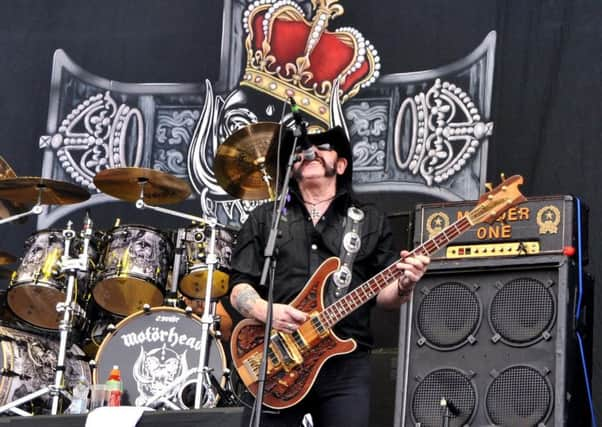Martyn McLaughlin: Lemmy leaves hole in a lot of lives


With his trademark black military hat and mutton chops framing a face that might easily be mistaken by a careless hillwalker as a map of the Cuillin, the look of Ian ‘Lemmy’ Kilmister was as uncommon as it was unceasing, a cross between the captain of a Civil War ghost ship and a gnarled frontiersman who might have played the antagonist in a Sergio Leone film, were the Italian to have foregone his beloved Spaghetti Westerns for a crack at the horror genre.
It was an image that readily invited caricature but it was no affectation. Here was a uniform which announced a man who lived life on his own terms, steadfastly refusing to yield to four decades of warnings and censures. At times it was a reckless life. For the most part, it was fun. Lemmy stood out as mankind’s middle finger, a scabrous, bourbon-sodden scourge whose insistence on having a good time all the time demonstrated how dedication need not be the bedfellow of sacrifice.
Advertisement
Hide AdAdvertisement
Hide AdFor the legions who participated in the communal euphoria of a Motörhead concert, it seems inconceivable that the voice of its gruff ringleader has fallen silent. In recent years, the notion that only Limmy and the cockroaches would survive a nuclear holocaust began to take on the form of truism. Now, with the news of his death just four days after turning 70, it can be revealed again as a joke, one especially cruel to those who witnessed his grubby majesty first-hand.
The experience of watching Lemmy in full flow, bullfrog face straining as his larynx conjured up undiscovered vowels, was unique in the pantheon of rock music. The sound was guttural and sometimes indistinct from the rumbling dread of his four-string Rickenbacker. Seldom, though, was it anything less than bracing, a bronchial howl that sounded like a German shepherd accidentally locked overnight in a damp garage, raging for a saucerful of something 80 proof to help make it through the night.
When I first saw the band back in 1991, it was revelatory. After a few fallow years, the era ushered in callow young metalheads into the fray of buckled bikers whose loyalty over the years could not be curbed by perpetual insobriety. As a 14-year-old heady on tonic wine and expectation, I joined the roar as Lemmy came out on the stage of the Barrowlands to snarl his unwavering introduction: “Good evening, we are Motörhead and we play rock and roll.”
Over the years, this statement of aggressive intent became a comforting reassurance of the aural bombardment that would follow. It was a noise that took the cautious rebellion of rockabilly and liberated it through a torrent of amphetamine sulphate and voltage. To the ears of the critics, the songs were interchangeable, but this was to miss the point. The galloping propulsion married the blunt menace of heavy metal to the intensity of punk. A Motörhead gig started out furious and stayed there, a masterclass in minimalism, force and volume overlaid with lyrics promoting an upbeat blend of nihilism.
Like AC/DC, arguably the last great rock and roll band still standing, the abiding joy of Motörhead was their intransigence. Both acts were discarded and rediscovered over the years according to fashion’s whims, yet neither cared nor sought to reform their signature sound into a state deemed palatable to contemporary tastes. “We’re kind of like the old chap who lives upstairs and they bring us down now and then and give us a cup of tea and send us back upstairs again,” Lemmy once remarked. “Trouble is, this old chap brings a knife down with him.”
With his death, it feels like the lineage that binds us to the origins of rock music has been severed. Born to an RAF pastor father and librarian mother just three months after the end of the Second World War, Lemmy formed part of a generation which grew up watching Tommy Steele concerts then found itself transfixed and transformed by the shock of the new. He saw Gene Vincent play in Prestatyn’s Royal Lido and took in The Beatles during their Cavern Club incubation.
It was often said that his indoctrination into rock and roll came during his time as a roadie for Jimi Hendrix, a vocation that primarily involved repairing shattered fuzzboxes and procuring industrial quantities of acid. Yet he had spent years beforehand earning his stripes playing around Greater Manchester in unheralded outfits like the Rockin’ Vickers and the Motown Sect.
Advertisement
Hide AdAdvertisement
Hide AdThose years cemented a love of music in a man who was more reflective than his persona suggested. An avid reader and history buff, Lemmy’s appetite for Jack Daniels was matched only by his consumption of PG Wodehouse stories and old Goon Show broadcasts, classic British eccentric influences that ensured he remained an accomplished aphorist even when fielded the same hoary enquiries by interviewers during Motörhead’s seemingly perpetual tour schedule.
While his peers rejected such a hard slog for a biannual burst of profitable arena shows or permanent retirement, Lemmy persisted. It was not through necessity – he lived in a modest two-bedroom flat in Los Angeles and other than a penchant for collecting Nazi memorabilia, had no vices beyond the most ruinous ones.
What took him out on stage time after time was simply a love of life on the road and the knowledge that, somewhere among the throng of bodies before him, there was another teenager hearing the band for the first time. Lemmy was duty bound to send them home delirious and exhausted.
He and Motörhead were due to play Glasgow next month, a date that has become an annual staple. The absence of that great rasping voice will be keenly felt, though I suppose we will always have the tinnitus.